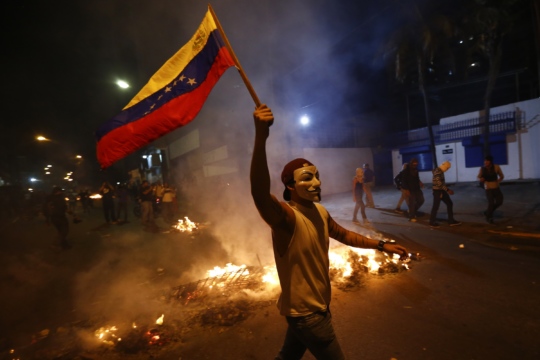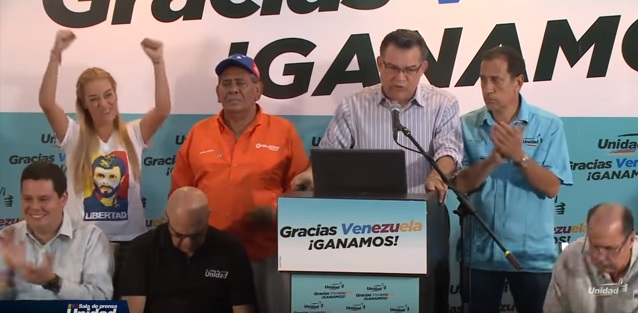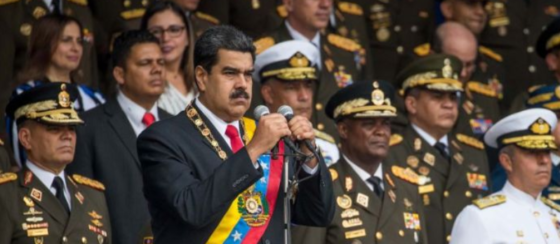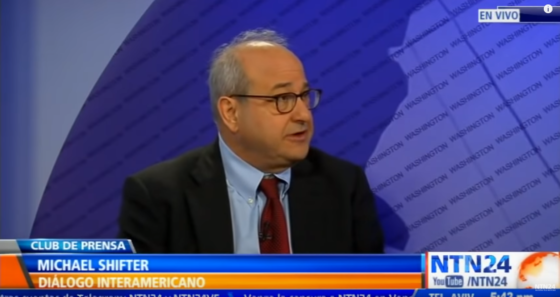
Can Anyone Save Venezuela?
An economic and humanitarian crisis, precipitated by the Maduro regime, has brought Venezuela to the brink of collapse.
A Daily Publication of The Dialogue
Venezuela’s opposition coalition on Sunday won a majority of seats in the country’s National Assembly, wresting control of the legislature away from the ruling United Socialist Party for the first time since late President Hugo Chávez’s election in 1998. What do the election results mean for President Nicolás Maduro and his grip on the presidency? Will he share power with the new National Assembly or seek to undermine it? What major laws and changes will lawmakers push through when they take office in January? What do the results mean for imprisoned opposition leaders?
Michael Shifter, president of the Inter-American Dialogue: Sunday’s election results sent a powerful message that the Bolivarian Revolution no longer enjoys popular support. The opposition coalition’s resounding victory—the margin was even greater than anticipated—was also a clear repudiation of Nicolás Maduro, who has presided over a dramatic deterioration in Venezuela’s economic, political, social and security situation. Maduro’s grip on the presidency, already weak before the legislative elections, is today even shakier. He will likely have to deal with an even more intense power struggle within the governing United Socialist Party. At least some sectors of the Democratic Unity Roundtable are expected to press for a recall referendum next year to remove him from power. Maduro, who deserves credit for recognizing defeat, should tone down the confrontational rhetoric and not usurp or undermine the incoming National Assembly’s authority, which includes approving an amnesty law for imprisoned opposition leaders like Leopoldo López. Although admittedly very difficult and improbable, he should also try to work with the opposition and encourage them to agree to reforms that everyone knows are fundamental but politically costly. To be sure, this strategy will not work if the opposition decides to pursue the recall referendum option, which would risk heightened polarization. The opposition should interpret Sunday’s results as a demand by Venezuelans to focus on solving the country’s profound problems. In the short term, tensions could well increase, as each side establishes its political position. Still, the elections mark a turning point, the environment has changed and a transition is already underway.
Gustavo Roosen, member of the Advisor board and president of IESA in Caracas: The victory of the Venezuelan opposition poses many challenges, both to the opposition and the government. The most important effort will be to achieve a proactive cohabitation mindset for resolving the nation’s main problems. One of them should be releasing political prisoners. Surveys that anticipated the victory of the opposition coalition also reported the expectations of the very large segment of the population with limited resources regarding what they would need from the new National Assembly. Their aspirations are to have a calm and orderly country, which provides opportunities for them and where the environment is that of dialogue. The new Assembly should work to achieve improvements in these three areas, and their first challenge is to involve the executive power in these tasks, to perform them together. In this scenario, a new actor must be part of the transformation of the country. One of the most important pre-election research findings is that the respondents attributed the economic decline and loss of quality of life to the weakening of the private business sector, which has been attacked by interventionist policies and revolutionary expropriations. Rapprochement and cooperation of the government and the Assembly with the industrial private sector would help them find ways to solve the compelling economic problems the nation faces, while the private sector can become the main supplier of the three elements to which marginalized classes aspire: order in the reconstruction, dialogue and employment opportunities.
Julia Buxton, professor of comparative politics at the School of Public Policy of Central European University in Budapest: Venezuela’s political situation will be fragile for months, if not years, ahead. The opposition will seek to maintain its electoral momentum, and the drive to collect four million signatures for a recall referendum will soon be under way. This looks unwinnable for Maduro, whom the PSUV will likely cast aside as a liability. But while the prospect of a fresh presidential election will force the PSUV to find and unify behind a new leader, for the opposition it opens up the possibility of very real divisions. The scenario for one sector of the MUD will be the use of the legislative majority to secure the release of Leopoldo López and the fairy tale of his triumph in a late-2016 presidential election. This will face a challenge from the sectors that cohere around Henrique Capriles who very much see their commitment to the ballot box as the driver of the Dec. 6 success. The MUD has learned the benefits of unity, but the extent to which it can be maintained is questionable. Radicals will want to move fast to overturn legislation and state appointments. But with power comes responsibility, and moving too quickly will alienate those voters who were finally persuaded to back the MUD. This will particularly be the case in relation to any proposed economic liberalization. Dialogue and negotiation within and between the PSUV and MUD is the only way to secure a violence-free transition from the Bolivarian revolution.
Beatrice Rangel, member of the Advisor board and director of AMLA Consulting in Miami Beach: Dec. 6, 2015 will be remembered as Venezuela’s new democratic dawn. Opposition forces were able to puncture the invincibility cloak that has enveloped Bolivarian forces since 1998. Food scarcity, rampant crime and unfettered corruption were the victory-propelling tailwinds. These defining features of Bolivarian rule convinced Venezuelans that no progress could be made for them or their children under the regime. Accordingly, the search for new leadership began. This entails the liberation of political prisoners, as part of the new leadership is all in jail. On the government front, Maduristas seem to have overcome more radical factions led by National Assembly President Diosdado Cabello. This also entails the undoing of several legislative measures concentrating power in the executive branch. And while President Maduro will seek to undermine the Assembly, it will be difficult for him to achieve that goal. A cabinet reshuffle is almost certain, as President Maduro will try to sail these difficult waters with loyalists. Should Maduro follow a Machiavellian dictum, he might appoint Cabello to a cabinet post, as enemies should be kept close. But the process of change has started and will see the arrival of new leadership both in the opposition as well as the Bolivarian ranks. The road will be fraught with conflict, but it is sure to lead to a bipartisan system that would have for the first time in Venezuelan history a genuine populist force and a genuine value-creating force. The greatest concern should now be the state of the economy, as continuing aggravation could turn friction into battles and battles into civil strife. This will perhaps define the limits of cooperation among the emerging political forces. And we might then cheer.
Arturo Sarukhan, board member of the Inter-American Dialogue and former Mexican ambassador to the United States: First, there’s no way around the fact that with 74.3 percent voter participation, a sizeable proportion of the population has backed change. The opposition coalition will pose a serious challenge to the government’s power to pass legislation, and its victory could energize a movement aiming to constitutionally drive Maduro from power. Second, in what has become the prime example of an illiberal democracy in the Americas—where accountability and checks and balances on who wields power have all but been eroded—the government still maintains formidable powers at its disposal. There is no way around that either, at least not in the short term, and the scenario of the government either buying off elected legislators or changing the rules of the game before they are sworn in is a distinct possibility. Third, the pressure brought to bear on Caracas by former heads of state seems to have paid off at a moment when sub-regional or regional organizations have turned a blind eye. Finally, social media has once again proven its relevance as a tool for mobilization in the face of a closed government controlling and restricting the flow of information. Going forward, two critical decisions must be confronted. If the opposition makes good on its promise to pass an amnesty law, the Maduro government may face no other choice than to free all political prisoners, including Leopoldo López. And throughout Latin America, the ‘see no evil, hear no evil, speak no evil’ of these past years is untenable. For nations aspiring to play a leading regional or global role, jettisoning the excuse of non-intervention in the face of systematic violations of fundamental rights needs to become the norm, not the exception.
The Latin America Advisor features Q&A from leaders in politics, economics, and finance every business day. It is available to members of the Dialogue's Corporate Program and others by subscription.
An economic and humanitarian crisis, precipitated by the Maduro regime, has brought Venezuela to the brink of collapse.
Venezuela’s government has made several arrests in what they say was an attempt to assassinate Maduro. What does it all mean?
En este episodio de Club de Prensa, Michael Shifter analizó el mensaje del presidente Maduro hacia su contraparte estadounidense sobre la caravana migrante, el plebiscito británico, las elecciones en Brasil y la situación argentina.


 Video
Video